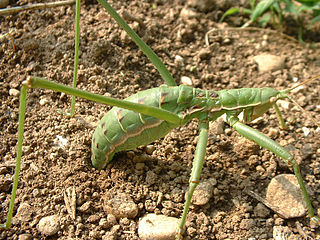
Insects in the family Tettigoniidae are commonly called katydids, or bush crickets. They have previously been known as "long-horned grasshoppers". More than 8,000 species are known. Part of the suborder Ensifera, the Tettigoniidae are the only extant (living) family in the superfamily Tettigonioidea.

Orthoptera is an order of insects that comprises the grasshoppers, locusts, and crickets, including closely related insects, such as the bush crickets or katydids and wētā. The order is subdivided into two suborders: Caelifera – grasshoppers, locusts, and close relatives; and Ensifera – crickets and close relatives.
Idiostatus middlekauffi, known as Middlekauff's shieldback katydid, is a species of katydid endemic to the United States. It is considered "critically endangered" on the IUCN Red List.

Zaprochilus, the twig-mimicking katydids, is a genus of bush crickets or katydids in the subfamily Zaprochilinae. They are found in Australia.

Macroxiphus is a small genus of bush crickets or katydids distributed in Southeast Asia and Micronesia. The nymphs of the insects mimic ants.
Panoploscelis is a genus of very large insects belonging to the true katydid tribe Eucocconotini, which is a subfamily of the Tettigoniidae. Like the other members of the suborder Ensifera, Panoploscelis are part of the insect order Orthoptera, which also contains crickets, grasshoppers and locusts. Members of this genus are among the largest katydids of the Neotropics.

Zabalius is a genus of bush crickets or katydids in the subfamily Pseudophyllinae. Its distribution is essentially Afrotropical. They are generally heavily built, tree-dwelling herbivorous katydids, capable of flight.
Aprosphylus is a genus of katydids found in southern Africa.

Saga is a genus of bush crickets or katydids containing around 15 species as of 2018. It is the only genus in the tribe Sagini and belongs to the subfamily Saginae. Species have been recorded from mainland Europe and western Asia.

Copiphora rhinoceros, the rhinoceros katydid, is a katydid found in Central America. It belongs to a group known as the conehead katydids and can be identified by a horn-like projection on the center of its head. The horn is used to ward off attacks from hungry bats. Unlike most katydids, which are herbivores, the rhinoceros katydid is an omnivore, feeding on fruit, seeds, invertebrates and small lizards. Its lifespan is one to two years.
Microtettigonia is a genus of bush-crickets or katydids, endemic to Western Australia and known as micro katydids. It is the only genus of the subfamily Microtettigoniinae.

Pterophylla camellifolia, the common true katydid, is a common North American insect in the family Tettigoniidae (katydids). Within the Tettigoniidae, it belongs to the subfamily Pseudophyllinae. Other common names include northern true katydid and rough-winged katydid.

Capnobotes fuliginosus is a species of katydid known as the sooty longwing. It is found in the western United States and Mexico. It is omnivorous and it is the prey of the wasp Palmodes praestans.

Tettigoniidea is an infraorder of the order Orthoptera, with six extant families.
Insara is a genus known as "western bush katydids": characteristic of the tribe Insarini and placed in the family Tettigoniidae, subfamily Phaneropterinae. There are about 6 described species in Insara.
Abila is a genus of lubber grasshoppers in the family Acrididae. There are at least four described species in Abila. They occur in South America.
Leuronotina is a genus of band-winged grasshoppers in the family Acrididae. There are at least four described species in Leuronotina.

Markia is a genus of katydids found in Central and South America.

Orophus tessellatus, the false leaf katydid, is a species of katydid native to Mexico, Central America, and South America. It is in the large subfamily Phaneropterinae within the tribe Amblycoryphini. Its coloring varies from brown to green, some with spots, mottling, or uniform in coloration. The body length reaches 16 mm (0.63 in) in males and 22 mm (0.87 in) in females. The ovipositor is approximate 7 mm (0.28 in) in length. The species is characterized by the size of the forewings and their "dirty" coloring.












